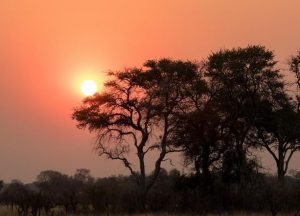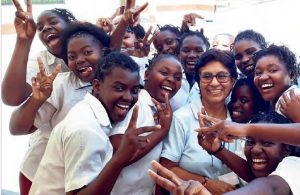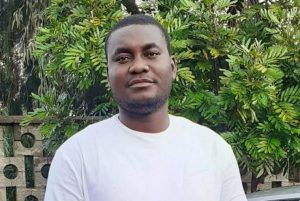The soldiers grabbed him. Fr. Barnaba did not resist. He asked to be allowed to take his cassock and pray. He put it on, made the sign of the cross, and recollected himself in prayer while the soldiers released the safety catch on their rifles. “I am ready,”
On 3rd September 1965, Hassar Dafalla, Commissary of the Bahr Ghazal province, in South Sudan, sent the following letter to the Bishop of Wau, Ireneus Wien Dud : “ I very much regret the death of Father Barnaba Deng, which occurred or the evening of August 23rd at a point three miles north of the army barracks on Aweil road. The official record that I received from the security forces on his case shows that suspicious behaviour was mainly responsible for his death. He was met by a military patrol at 6.30 p.m. while parking a car at the side of the road, in an area which everybody knew was quite notorious and, ignoring the curfew, had aroused the suspicion of the patrol. When the man in charge of the section stopped the car to make inquiries, Father Barnaba, who was dressed in shorts and a shirt, stepped down from the car and attempted to run away. Failing to obey the army order to stop, he was shot dead’.
The letter continued: “ It may be relevant here to mention that our intelligence record of Father Barnaba is not clear. He was observed many times collecting monetary donations for the Anya Nya and it was suspected that he was supplying them with food and ammunition in the mission car, in addition to typing their leaflets and correspondence. His activities were mainly centred on Odwel near Aweil. The circumstances of his case under review have also cast a heavy shadow of doubt over his relations with the outlaws”.
The letter concluded: “I feel it my duty to bring to the attention of Your Lordship that this is the second occasion of substantiated relationships between the Anya Nya rebels and the Catholic Church. The first occasion was after the demise of Father Archangel, which took place on 21st July. (The soldiers killed Fr. Archangel on July 21st 1965). The file included the very portrait of the priest himself which gave clear indication as to his association with their dealings.”
The real story was, of course, entirely different. The Khartoum government of 1964 did not want eyewitnesses to what was happening in the country, so on March 3rd they expelled all the missionaries – more than 300 Comboni fathers, brothers and sisters. Many places of worship were destroyed, many Christians killed and communities dispersed.
The Anya-Nya movement was established as a loosely knit rebel group in 1963, deriving its name from a snake poison. This guerrilla army’s core members were veterans of the 1955 mutiny in Torit. However, the revolt failed and the repression of the Khartoum government was severe. This then, is the true story of Fr Barnaba Deng.
Barnaba Deng was born in Atokuel, a small village of Kwajok Mission, Bahr el Ghazal, towards the end of 1935. He belonged to the Dinka Rek. Barnaba’s mother was the second wife of Akec on whose death, she was not, contrary to the custom, inherited by a brother or relation of the late husband. She remained in her hut and brought up her family alone. She succeeded in sending little Barnaba to the Catholic school of Gogrial. She did not object when he told her that he frequented the catechumenate. The boy was baptised on 1st June 1947 in Kwajok.
Two years later, having finished the Primaries in Mbili, Barnaba asked his mother’s permission to enter the seminary. She was not a Christian and, although understanding little about what the boy asked, she gave her consent. Barnaba was received into Bussere seminary on the 25th February 1949. Having completed Secondary School, he left for Lacor in Gulu, Uganda. When St. Paul’s Seminary in Tore River was founded, Barnaba left Uganda and spent 2 years there before he expressed his wish to enter the Comboni Institute.
In 1957, Barnaba was sent to Italy to join the Comboni Missionary novitiate of Gozzano in Novara. two years later he went to Venegono Superiore in Varese in the North Italy for the theological course. He was ordained priest in Milan on 7th April 1962 by Cardinal Montini.
A few months later, he was back in South Sudan, first in the mission of Dem Zubeir, then in those of Raga, Gordhiim, and Aweil. In November 1963, he was transferred to the town of Aweil, where he was in charge of three missions: Aweil, Nyamlel and Gordhiim. Bidding farewell to the last missionaries whose cars the soldiers had looted on 4th March 1964, he spoke these prophetic words – ‘Father, pray for us. We shall see each other again only in heaven’.
Month after month, he went around visiting the scores of Christian communities entrusted to his pastoral care. In Nyamlel, the soldiers had been so busy with their killing that there were hardly any Christians left to visit. It soon became clear that the government officials were after him as well. Since he was going from village to village with clothes and food, they saw him as bringing supplies for the “Dinka soldiers”. Now his name was amongst those that had to be eliminated. But now another Dinka enters the story. His name was Santino Deng, a Dinka who had defected to the Arabs and taken upon himself the infamous task of denouncing his own brothers.
One morning, news reached Fr Barnaba that Santino Deng had come to Aweil with a contingent of soldiers. At once he called Cyril, the house boy and went to the market square to have a meeting with Santino Deng’s secretary. There, they heard disquieting news: “ There is an order to arrest you and Acuil Mayuen (a Dinka merchant), they were told. ‘The soldiers have been ordered to arrest you and kill you”.
Fr. Barnaba lost no time in making good his escape, but not before passing the news to Acuil Mayuen. He returned immediately to his mission and after hurriedly loading some things into the car, made for the forest. At the end of the road, he abandoned his car and proceeded on foot. Cyril was sent back to the mission to ascertain from a safe distance what was happening back at the mission. In the mission yard were soldiers’ cars with the headlights on. The soldiers went to Father Barnaba’s house, and after breaking down the doors they searched every corner. Full of fear, Cyril fled and spent the night under a tree, with some women who had also fled, on hearing gunfire near their houses.
At sunrise, Cyril went back to the mission, saw what the soldiers had done during the night and returned to the forest where he reported all he had seen to Fr Barnaba: “They have forced open all the doors except that of the office which they did not succeed in opening.”
Fr Barnaba gave him the keys and some clear instructions: “Go and bring me the typewriter and what remains of the money. But be careful not to be seen.” The boy came back successfully, two hours later with the typewriter and the money. The Father gave him some money so that he could go to the market and buy food.
Meanwhile, ten other people had sought refuge in the forest. The majority were women and children who feared the revenge of the Arab soldiers who were hunting those who had defected to the guerrillas. As evening fell, Father Barnaba made a plan: “Let us go to my mother’s house. She is alone and certainly anxious about me.” Everyone decided to follow him, including Cyril.
Non one else knew the paths leading to the small village of Kwajok, so by shunning the usual roads and walking from dawn to dusk, on the evening of the fifth day the group arrived safely at the hut of Fr Barnaba’s mother. She could not believe her eyes. Deeply moved, she embraced him, spitting abundantly on him, as is the Dinka custom. She prepared maize porridge for everyone. After supper the women exchanged their news. ‘Thanks be to God, here we are at peace,’ said mother Aluel, wishing them good night.
The following morning, however, Fr Barnaba said that he was thinking of going to Wau and of taking a radio: “We are completely cut off from the world, without news.” His mother objected, saying that it was dangerous and that one could certainly live without news. But Fr. Barnaba insisted, saying that Cyril would accompany him. In the end his mother gave in and wished him a happy journey.
As they came near Wau, Father Barnaba gave a message to Cyril to be taken to a priest of the town. One hour later, a car came, driven by the priest who had received the message. He took Fr. Barnaba to the mission. There was little traffic in the town. People avoided the roads because the scene of the massacre that had taken place the previous month was still vividly etched in their minds.
All was very quiet in the afternoon, and Fr Barnaba went out by car. ‘I would like to visit some families,’ he said to the priest. He planned also to see a sick person, and so he carried his cassock. As usual he took Cyril, and after having seen the market, he drove in the direction of Aweil. At the airport crossing before Khor Grinti, he noticed a military convoy on the road.
He turned back and parked the car off the road and waited for all the cars to pass. The boy counted them. Five had passed, the sixth seemed about to pass too, but it stopped. On board was Santino Deng, the renegade Dinka, who recognised Fr. Barnaba and said to the soldiers: ‘Look, there’s the one we were looking for in Aweil!’ The soldiers grabbed him. Fr. Barnaba did not resist. He asked to be allowed to take his cassock and pray. He put it on, made the sign of the cross, and recollected himself in prayer while the soldiers released the safety catch on their rifles. “If you wish, I am ready,” he said, looking at Santino. A soldier broke away from the others and from very close range fired at his head.
The Father fell backwards. The same soldier finished him off with three bullets in the chest. It was 16.30 on 23rd August. Father Barnaba was only thirty years old. The convoy left, but five soldiers remained to guard the body. Cyril, trembling after all that he had seen, ran to carry the news to the nearby parish. He came back with a priest and asked for permission to take the corpse. They refused. He went back to the mission and returned with another priest to recover Fr. Barnaba’s car, left on the roadside. After some hours, the soldiers buried Fr. Barnaba’s corpse nearby. The grave was very shallow, and during the night the hyenas played havoc with his body. A year later, Acuil Mayuen, the Dinka merchant who had been placed on the list with Fr. Barnaba, was also killed.






